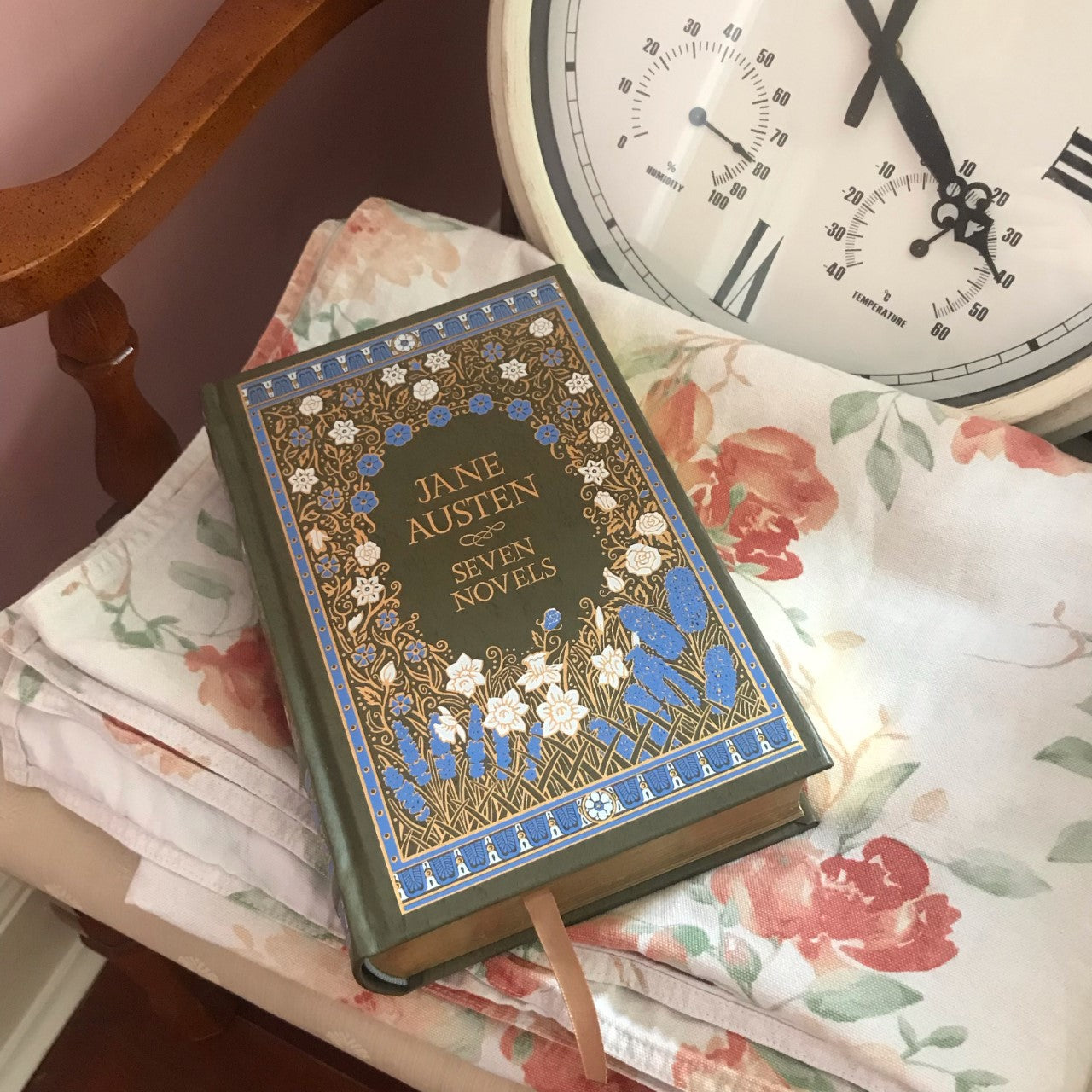
Jane Austen's Divine Comedy

Though Jane Austen is known by many today as a writer of romance, those who are familiar with her work know that she is one of the best comedic English writers, rivaling the likes of William Shakespeare, Charles Dickens, Douglas Adams, Gurinder Chadha, and Phoebe Waller-Bridge with her sharp satire and larger-than-life (but somehow still true-to-life) characters.
In honor of celebrating Austen’s comedic qualities, here is a list of some of Austen’s funniest characters. Austen’s characters are so funny, in fact, that it is difficult to narrow down! Here are a few of my favorites, in no particular order.
1. Mrs. Bennet, Pride and Prejudice - It will probably come as no surprise to Austen fans that Mrs. Bennet makes the final cut. Mrs. Bennet might not be the first meddling mother in literature, but she is certainly one of the most memorable. She pushes her daughters into relationships they often don’t want, flip-flops on her feelings about suitors (she hates Mr. Collins! No wait, she loves Mr. Collins! And now she hates him again!), and isn’t afraid to make a public spectacle of herself. Her lack of sense and decorum make her a bit ridiculous, but you have to hand it to her, there is no fiercer champion for her daughters (so long as they’re doing what she wants!).
Comedic Highlight:
“Nobody can tell what I suffer! But it is always so. Those who do not complain are never pitied.”
2. Mr. Collins, Pride and Prejudice- Of course I can’t write about Pride and Prejudice without mentioning Mr. Collins. Mr. Collins is the epitome of the awkward suitor–self-important without being self-reflective, jumping from object of affection to object of affection with little consideration to the individuals involved, and refusing to take no for an answer. He might be absolutely insufferable if he weren’t also so completely ridiculous. (Methinks Austen must have dealt with a Collins or two in her time to portray this personality type so accurately that 21st-century readers still shudder with familiarity when reading about him.)
Comedic Highlight:
“He [Mr. Collins] begged pardon for having displeased her [Mrs. Bennet]. In a softened tone she declared herself not at all offended; but he continued to apologise for about a quarter of an hour.”
3. Mrs. Jennings, Sense and Sensibility - Mrs. Jennings might be one of my personal all-time favorite Austen comedic characters. Is it that she has no self-awareness, or that she’s just too rich and old to care what anyone thinks of her anymore? The meddlesome, silly, gossipy persecutor of Marianne Dashwood’s fine feelings also proves to be a surprisingly true and devoted friend. She might have no qualms about sharing your latest heartbreak with all of London, but she’ll also bring you the finest wine and treats when you’re down and already be on the lookout for your next conquest.
Comedic Highlight:
“‘Poor soul!’ cried Mrs. Jennings, as soon as she [Marianne] was gone, ‘how it grieves me to see her! And I declare if she is not gone away without finishing her wine! And the dried cherries too! Lord! nothing seems to do her any good. I am sure if I knew of any thing she would like, I would send all over the town for it. Well, it is the oddest thing to me, that a man should use such a pretty girl so ill! But when there is plenty of money on one side, and next to none on the other, Lord bless you!’”
4. Mr. and Mrs. Palmer, Sense and Sensibility - As much as Mr. Palmer might be loathe to admit it, he and Mrs. Palmer work best as a pair–at least, as a comedic pair. Their marriage might be a disaster, but their complete-opposite personalities make their exchanges some of the highlights of Sense and Sensibility. Mr. Palmer’s rudeness, and Mrs. Palmer’s inability (or unwillingness) to take insult at anything he says, paints a truly hilarious picture of wedded torture.
Comedic Highlight:
“‘How charming it will be,’ said Charlotte, ‘when he is in Parliament!—won’t it? How I shall laugh! It will be so ridiculous to see all his letters directed to him with an M.P.—But do you know, he says, he will never frank for me? He declares he won’t. Don’t you, Mr. Palmer?’
Mr. Palmer took no notice of her.
‘He cannot bear writing, you know,’ she continued—’he says it is quite shocking.’
‘No,’ said he, “I never said any thing so irrational. Don’t palm all your abuses of language upon me.’
‘There now; you see how droll he is. This is always the way with him! Sometimes he won’t speak to me for half a day together, and then he comes out with something so droll—all about any thing in the world.’
5. Miss Bates, Emma - As the loquacious local spinster, Miss Bates has a knack for irritating the eponymous heroine of Emma. Miss Bates seems to be constantly talking without ever having much to say, but her kindness and sincerity elevate her from being simply a laughingstock. Though her poverty and low social station give some real pathos to Miss Bates’s situation, one must wonder if Austen wasn’t poking fun at the stereotypes of unmarried women; if she’d been written in modern day, one imagines Miss Bates might have a lot of cats.
Comedic Highlight:
“All this spoken extremely fast obliged Miss Bates to stop for breath; and Emma said something very civil about the excellence of Miss Fairfax’s handwriting.
‘You are extremely kind,’ replied Miss Bates, highly gratified; ‘you who are such a judge, and write so beautifully yourself. I am sure there is nobody’s praise that could give us so much pleasure as Miss Woodhouse’s. My mother does not hear; she is a little deaf you know. Ma’am,’ addressing her, ‘do you hear what Miss Woodhouse is so obliging to say about Jane’s handwriting?’
And Emma had the advantage of hearing her own silly compliment repeated twice over before the good old lady could comprehend it.”
6. Henry Tilney, Northanger Abbey - Henry Tilney might be one of the few characters in Austen’s writing who seems to be in on the joke, with his sharp witticisms often echoing the narrative’s sly tone. Of all of Austen’s heroes, he’s the most playful, and his relationship with Catherine is filled with silliness and banter. He might not be the most dashing of Austen’s heroes, but he certainly seems to be the one who’s having the most fun.
Comedic Highlight:
“‘And so I am at home—only I do not find so much of it. I walk about here, and so I do there; but here I see a variety of people in every street, and there I can only go and call on Mrs. Allen.’
Mr. Tilney was very much amused.
‘Only go and call on Mrs. Allen!’ he repeated. ‘What a picture of intellectual poverty!’”
7. The Narrator, all novels - As funny as all of the above-listed characters are, none are perhaps quite as funny as the omniscient third-person narrator who guides us through each of Austen’s novels. Witty, sarcastic, and cutting, Austen’s narrator takes no prisoners, highlighting the ridiculousness of characters, situations, and settings alike. Even the Austen novels that aren’t traditionally thought of as being especially humorous are filled with gems, like the one below from Mansfield Park:
Comedic Highlight:
“Even in the midst of his late infatuation, he had acknowledged Fanny’s mental superiority….She was of course only too good for him; but as nobody minds having what is too good for them, he was very steadily earnest in the pursuit of the blessing, and it was not possible that encouragement from her should be long wanting.”
Elizabeth Gilliland is an instructor at university-level who puts as much Austen into her class lectures as she can manage. She received her PhD from Louisiana State University in 2018 and wrote her dissertation on Jane Austen adaptations. She is the author of What Happened on Box Hill, the first in the Austen University Mysteries series. Learn more about her book here, or read on below for a quick blurb.
What would happen if you combined all of Austen's characters into one modern-day novel?
Murder, of course.
When Caty Morland's roommate, Isabella, falls to her death on Initiation Night, Austen University is quick to cover up the scandal and call it a tragic accident. But avid true-crime lover Caty remains convinced that Isabella didn't fall; she was murdered. With the help of Pi Kappa Sigma President Emma Woodhouse, Caty organizes a dinner party with the most likely suspects, including familiar faces such as Darcy, Elizabeth Bennet, Knightley, and Marianne Dashwood. The theme of the night is murder, and Caty has three courses to find out what happened to Isabella—and to try to keep the killer from striking again.
What Happened on Box Hill is Book 1 of the Austen University Mysteries series.



Leave a comment
This site is protected by reCAPTCHA and the Google Privacy Policy and Terms of Service apply.